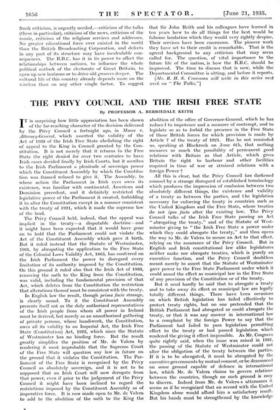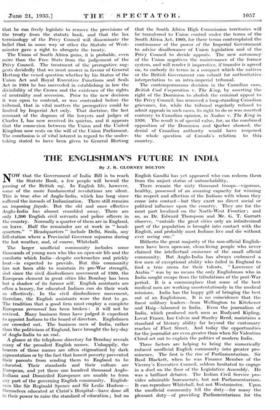THE PRIVY COUNCIL AND THE IRISH FREE STATE
By PROFESSOR A. BERRIEDALE KEITH
IT is surprising how little appreciation has been shown of the far-reaching character of the decision delivered by the Privy Council a fortnight ago, in Moore v. Attorney-General, which asserted the validity of the Act of 1933 of the Irish Free State abolishing the right of appeal to the King in Council granted by the Con- stitution. It is not merely that it returns to the Free State the right denied for over two centuries to have Irish cases decided finally by Irish Courts, but it ascribes to the Irish Parliament a plenitude of sovereign power which the Constituent Assembly by which the Constitu- tion was framed refused to give it. The Assembly, to whose action the Parliament in Irish eyes owes its existence, was familiar with continental, American and Dominion precedent, and it definitely restricted the legislative power of the Parliament it created, forbidding it to alter the Constitution except in a manner consistent with the treaty of 1921, which it made the supreme law of the land.
The Privy Council held, indeed, that the appeal was implicit in the treaty—a disputable doctrine—and it might have been expected that it would have gone on to hold that the Parliament could not violate the Act of the Constituent Assembly which gave it birth. But it ruled instead that the Statute of Westminster, 1931, by abrogating the application to the Free State of the Colonial Laws Validity Act, 1865, has conferred on the Irish Parliament the power to disregard every limitation of its authority imposed by the Constitution. On this ground it ruled also that the Irish Act of 1933, removing the oath to the King from the Constitution, was valid, including the fundamental provision of that Act, which deletes from the Constitution the restriction that alterations thereof must be consistent with the treaty.
In English law the result, though prima facie strange, is clearly sound. To it the Constituent Assembly presents itself not as the duly authorized representatives of the Irish people from whom all power in Ireland must be derived, but merely as an unauthorized gathering of private persons, whose handiwork, the Constitution, owes all its validity to an Imperial Act, the Irish Free State (Constitution) Act, 1922, which since the Statute of Westminster has no binding force. But the result greatly simplifies the position of Mr. de. Valera by rendering it most improbable that the Supreme Court of the Free State will question any law in future on the ground that it violates the Constitution. The Par- liament of the Free State is recognized by the Privy Council as absolutely sovereign, and it is not to be supposed that an Irish Court will now derogate from that power, even if prior to the judgement of the Privy Council it might have been inclined to regard the restrictions imposed by the Constituent Assembly as of imperative force. It is now made open to Mr. de Valera to add to the abolition of the oath to the King the abolition of the office of Governor-General, which he has reduced to impotence and a measure of contempt, and to legislate so as to forbid the presence in the Free State of those British forces for which provision is made by Article 7 of the treaty of 1921. Has he not reminded us, speaking at Blackrock on June 6th, that nothing menaces so much the possibility of permanent good relations with Britain as that Article, which gives Britain the right to harbour and other facilities required in time of war or strained relations with a foreign Power ?
All this is clear, but the Privy Council has darkened counsel by a strange disregard of established terminology which produces the impression of confusion between two absolutely different things, the existence and validity of a treaty as between the parties, and the legislation necessary for enforcing the treaty in countries such as the United Kingdom and the Free State, where treaties do not ipso facto alter the existing law. The Privy Council talks of the Irish Free State passing an Act " abrogating the treaty," and of the Statute of West- minster giving to " the Irish Free State a power under which they could abrogate the treaty," and thus opens the way to Mr. de Valera to secure an Act to that effect, relying on the assurance of the Privy Council. But in English and Irish constitutional law alike legislatures neither make nor abrogate treaties, which is purely an executive function, and the Privy Council doubtless meant merely to assert that the Statute of Westminster gave power to the Free State Parliament under which it could annul the effect as municipal law in the Free State of any provision of the Constitution or of the treaty.
But it need hardly be said that to abrogate a treaty and to take away its effect as municipal law are legally totally different things. There have keen occasions on which British legislation has failed effectively to protect treaty rights, but no one pretended that the British Parliament had abrogated or could abrogate the treaty, or that it was any answer in international law to a complaint by the foreign Power to say that the Parliament had failed to pass legislation permitting effect to the treaty or had passed legislation which rendered the giving it effect impossible. As Mr. Cosgrave quite rightly said, when the issue was raised in 1931, the passing of the Statute of Westminster could not alter the obligation of the treaty between the parties. If it is to be abrogated, it must be abrogated by the executive governments by mutual consent, or be denounced on some ground capable of defence in international law, which Mr. de Valera claims to govern relations between the countries, though no such ground is easy to discern. Indeed from Mr. de Valera s utterances it seems as if he recognized that an accord with the United Kingdom alone would afford him a satisfactory result. But his hands must be strengthened by the knowledge that he can freely legislate to remove the provisions of the treaty from the statute book, and that the lax terminology of the Privy Council will disseminate the belief that in some way or other the Statute of West- minster gave a right to abrogate the treaty.
The Union of South Africa gains, it is probable, even more than the Free State from the judgement of the Privy Council. The treatment of the prerogative sug- gests decidedly that we must answer in favour of General Hertzog the vexed question whether by his Status of the Union Act and Royal Executive Functions and Seals Act in 1934 he has succeeded in establishing in law the divisibility of the Crown and the existence of the rights of neutrality and secession. Prior to the new decision it was open to contend,. as was contended before the tribunal, that in vital matters the prerogative could be limited by Imperial Act only. That doctrine, the last remnant of the dogmas of the lawyers and judges of Charles I, has now received its quietus, and it appears that the connexion between the Union and the United Kingdom now rests on the will of the Union Parliament. The conclusion is of vital interest in regard to the under- taking stated to have been given to General Hertzog that the South Africa High Commission territories will be transferred to Union control under the terms Of the South Africa. Act, 1909, for these terms contemplated the continuance of the power of the Imperial Government to advise disallowance of Union legislation and of the Privy Council to decide appeals. The new autonomy of the Union negatives the maintenance of the former system, and will render it imperative, if transfer is agreed on, to embody its terms in a compact which the natives or the British Government can submit for authoritative interpretation to an intra-imperial tribunal.
The contemporaneous decision in the Canadian case, British Coal Corporation v. The King, by asserting the right of the Dominion to abolish the criminal appeal to the Privy Council, has remold-ed a long-stending Canadian grievance, for, while the tribunal regularly refused to admit appeals in such cases, its right to do so was asserted contrary to Canadian opinion, in Nadan v. The King in 1926. The result is of special value, for, as the combined opposition of the Dominion and Quebec showed, the denial of Canadian authority would have reopened the whole question of Canada's relation to this country.









































 Previous page
Previous page